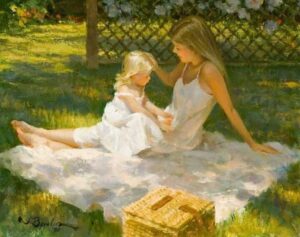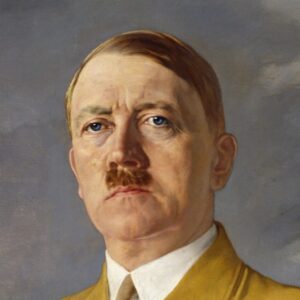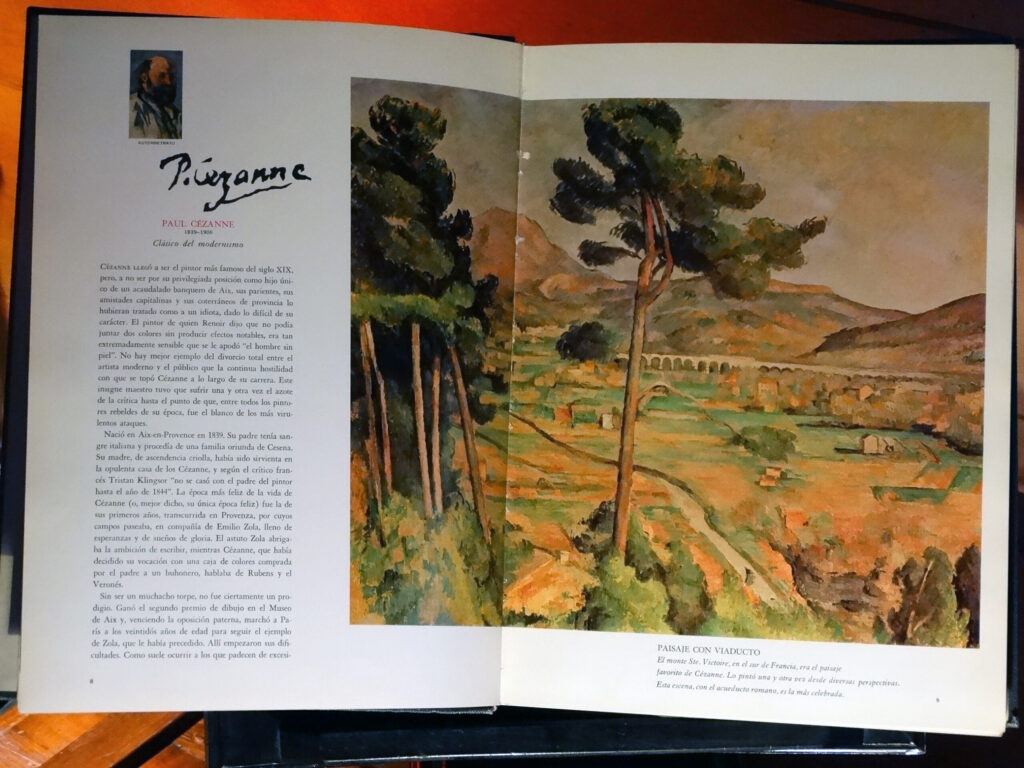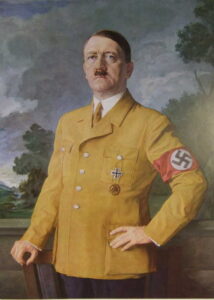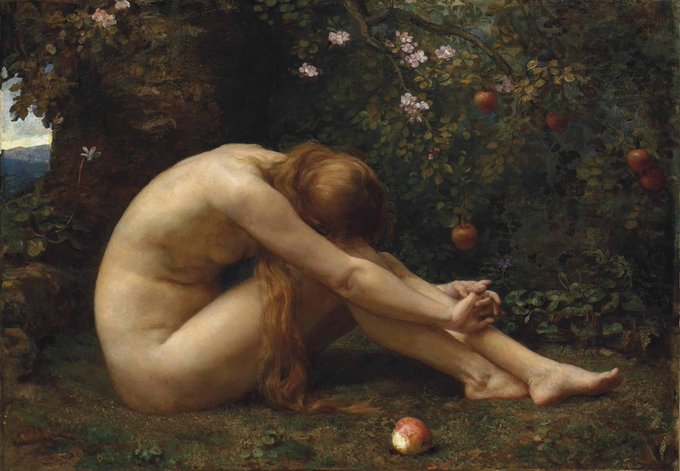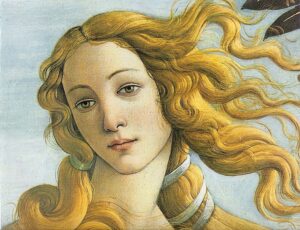Category: Painting
Thus spake…
Editor’s note: The following words from Nietzsche’s Zarathustra epitomise what I meant the day before yesterday when I mentioned that Hitler believed that overmanhood could only arise on Earth, and that his love for painting was much deeper than the average racialist can imagine (e.g., ancient painters like Claude Lorrain or modern ones like Parrish motivated me to take my vows in the priesthood of the sacred words).
______ 卐 ______
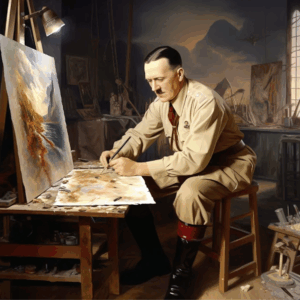 Behold, I teach you the overman!
Behold, I teach you the overman!
The overman is the meaning of the earth. Let your will say: the overman shall be the meaning of the earth!
I beseech you, my brothers, remain faithful to the earth and do not believe those who speak to you of extraterrestrial hopes! They are mixers of poisons whether they know it or not.
They are despisers of life, dying off and self-poisoned, of whom the earth is weary: so let them fade away!
Once the sacrilege against God was the greatest sacrilege, but God died, and then all these desecrators died. Now to desecrate the earth is the most terrible thing, and to esteem the bowels of the unfathomable higher than the meaning of the earth!
Once the soul gazed contemptuously at the body, and then such contempt was the highest thing: it wanted the body gaunt, ghastly, starved. Thus it intended to escape the body and the earth.
Oh this soul was gaunt, ghastly and starved, and cruelty was the lust of this soul!
But you, too, my brothers, tell me: what does your body proclaim about your soul? Is your soul not poverty and filth and a pitiful contentment?
Truly, mankind is a polluted stream. One has to be a sea to take in a polluted stream without becoming unclean.
Behold, I teach you the overman: he is this sea, in him your great contempt can go under.
Colour accuracy
by Heinrich
I read a quote from Lothrop Stoddard who had met Hitler, describing his hair as “blond-brown”. I became more convinced that the mainstream narrative is false when I encountered a painting by Heinrich Knirr who is the only artist ever to paint Hitler from life.
One painting in particular which we know with 100% accuracy is not a photo copy and was made in excellent lighting conditions is the Der Führer 1937. He painted two examples of this, one of which was exhibited at the Große Deutsche Kunstausstellung that year, and the other was brought to London by J. von Ribbentrop.
The one kept in Germany was destroyed in the war and there are only later colourisations circulating on the internet available, but the other one at the British Imperial War Museum shows him with light to medium blond hair.
Cézanne
After the fifth instalment of selected quotes from Benjamin’s book, I had planned to comment on Brendan Simms’ biography about Hitler. That way, I would be interspersing a post about the four words—which includes stopping abusing children—with another post about the fourteen words.
But since I am also a victim of abusive parents and a psychiatrist my mother hired to finish destroying me, reading Consumption makes me dwell on my past, especially since these days I have been suffering from what I wrote on the first day of the month in “Selfish heirs.” In many ways, my past was as handicapping as Benjamin’s. For example, it is unclear what will become of me when I run out of money from the sale of my parents’ house, divided among six heirs.
On the one hand, it is true that someone like “Bran the Broken”, whom (in my appropriation, not in the novel) his beloved father threw off the tower and who, with his broken spine, can no longer lead a normal life, can see his biographical past and even History from a paranormal perspective that normies, who lack that retrocognitive gift, can’t.
But on the other hand, material needs remain imperative. Even in the HBO adaptation of Martin’s novels—directed by a couple of Jews who in many ways betray the author—it can be seen that Bran enters the mind of his pet wolf to have the illusion of eating when, in reality, he is not feeding himself. These astral journeys can be harmful in that, in real life, Bran must feed himself, as his travelling companion Jojen warns him. The novel is even more sinister than the HBO series because it seems to suggest that, already in the cave and learning the magic of the three-eyed raven, Jojen allowed himself to be sacrificed so that Bran could eat a paste that was made from his body thanks to the culinary arts of the children of the forest…
I can say something similar about my countless journeys into inner space. Like Van Gogh and the painters of his time, I have sacrificed the most basic aspects of physical survival in pursuit of enlightenment about what happened in my early life. The difference, of course, is that in the real world there are no children of the forest to help me, even with their black magic. I have survived to the age at which Cézanne died, but it is unclear how I will survive when I reach my seventies. It really sucks that, if my literary work has any value (I am referring to the trilogy), I have to die to be recognised. And that’s if you’re lucky! (the work of Aristarchus of Samos, for example, was lost forever when the Christians destroyed the Library of Alexandria).
I will end this post with an image of the very copy that I used to look at with my parents when I was a child, around five or six years old: a book that inspired me greatly to understand the great painters. I am referring to an image of the first painter reviewed in the book, Cézanne:
Painters
“I can’t change the fact that my paintings don’t sell”.
—Vincent Van Gogh
It is curious that as a very young child, and we are talking about sixty years ago now, thanks to the artistic spirit that my dad instilled in me, I was so passionate about the great painters. But it was not until 1999 that I realised the great similarity between their unfortunate lives and mine.
I have spoken of the tragic life of Nietzsche, who by the end of the 19th century suffered a psychotic breakdown from which he never recovered, dying in the last year of the century. But curiously, it was in those same years, and at the beginning of the 20th century, that the painters I became familiar with as a child also suffered terribly and died.
The classic example is Vincent van Gogh, and I believe that unlike the anti-white poison of today’s films, anyone who believes, like Hitler, that painting plays a vital role should watch the movie Lust for Life (which can be viewed for free here).
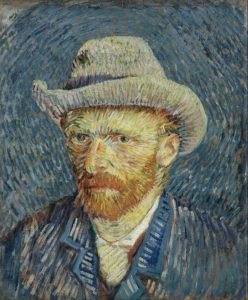 Vincent, an exponent of post-impressionism, died in 1890 at the age of thirty-seven. But Seurat, who was always financially dependent on his mother, died even younger: at the age of thirty-one, in 1891. Toulouse-Lautrec, who had been a friend of Van Gogh’s, died a decade later, in 1901, at the age of thirty-six. And Gauguin, Van Gogh’s fateful friend in Arles, died a couple of years later, in 1903. As the father of the solitary Cézanne—a post-impressionist painter like Van Gogh and Gauguin—was a banker, this misunderstood artist was financially secure and managed to reach the age I am now, dying in 1906.
Vincent, an exponent of post-impressionism, died in 1890 at the age of thirty-seven. But Seurat, who was always financially dependent on his mother, died even younger: at the age of thirty-one, in 1891. Toulouse-Lautrec, who had been a friend of Van Gogh’s, died a decade later, in 1901, at the age of thirty-six. And Gauguin, Van Gogh’s fateful friend in Arles, died a couple of years later, in 1903. As the father of the solitary Cézanne—a post-impressionist painter like Van Gogh and Gauguin—was a banker, this misunderstood artist was financially secure and managed to reach the age I am now, dying in 1906.
I identify with these artists because I am convinced that innovative artistic expression is an escape valve from personal misfortune. Unlike academic painters, and like El Greco (it took the world three centuries to recognise the genius of this Spaniard!), these painters revealed the world in unexpected ways. And it is tragic that they sought in vain to sell their paintings during their lifetimes, because the canvases only reached fabulous prices after their deaths. For example, all art shops have reproductions of Van Gogh’s Bedroom in Arles, The Yellow Chair or Sunflowers, but the poor Dutch painter only sold a single painting in his lifetime.
That fate doesn’t terrify me so much. What really terrifies me is that what happened to Gauguin will happen to me. After he died at the age of fifty-four on one of the Marquesas Islands, a fisherman who found his works in the artist’s humble hut—threw them all into the sea!
At this point in my life, what matters is that something similar doesn’t happen to my intellectual legacy if I die prematurely or unexpectedly. That is why I have decided to translate my trilogy, and I ask visitors to save the PDFs of the featured post on their hard drives: anthologies by various writers.
2 founding fathers
In the middle of the year I added a post in which I was alarmed about the existence of serial child killers in the US. These last few days, however, I have seen a lot of videos of horrific murders committed by American adults on other adults.
I won’t mention the names of the perpetrators, which you can easily find out by looking them up on YouTube. Still, I am now thinking of a young Aryan lad in whose room his mother found a bag containing a human head (in police interrogation the lad gloated that he had destroyed the corpse’s eyes with a knife); a woman who had killed her mother and hid her body in the garage until the cops found her; another woman who killed seven of her newborn babies and collected their corpses in boxes that began to smell bad; a man who suffered from the same disease that depressed Robin Williams but, unlike the famous actor, butchered his wife with a small but sharp knife (the video reveals that the policeman who entered the crime scene had to get out and throw up the turkey because of what he had seen, as the day before had been Thanksgiving Day), etcetera.
There is no doubt that American society is sick. But the serious thing is that practically no one, not even white nationalists, realises the causes of the spiritual sickness that has befallen their society. Only Americans like Francis Parker Yockey began to sense the cause, but his best-known work, Imperium, was written in prose so opaque that, in my opinion, it is no longer of any use to us in this century.
Writing in prose so clear and transparent that the essentials can be said in a short blog post, the darkest hour (Kali Yuga) not only of the US but of the West began in 1945. Two of the featured posts that can be read on the menu of this site, ‘Founding Myth’ and ‘The Iron Throne’ deal with the matter and I need not repeat myself. What I would like to clarify today is something else.
I have recently said some very harsh things about the ‘Founding Father’ of the Americans, George Washington, because of his philo-Semitism. But I, born south of the Rio Grande, could say the same about the Founding Father of Mexico: Hernán Cortés.
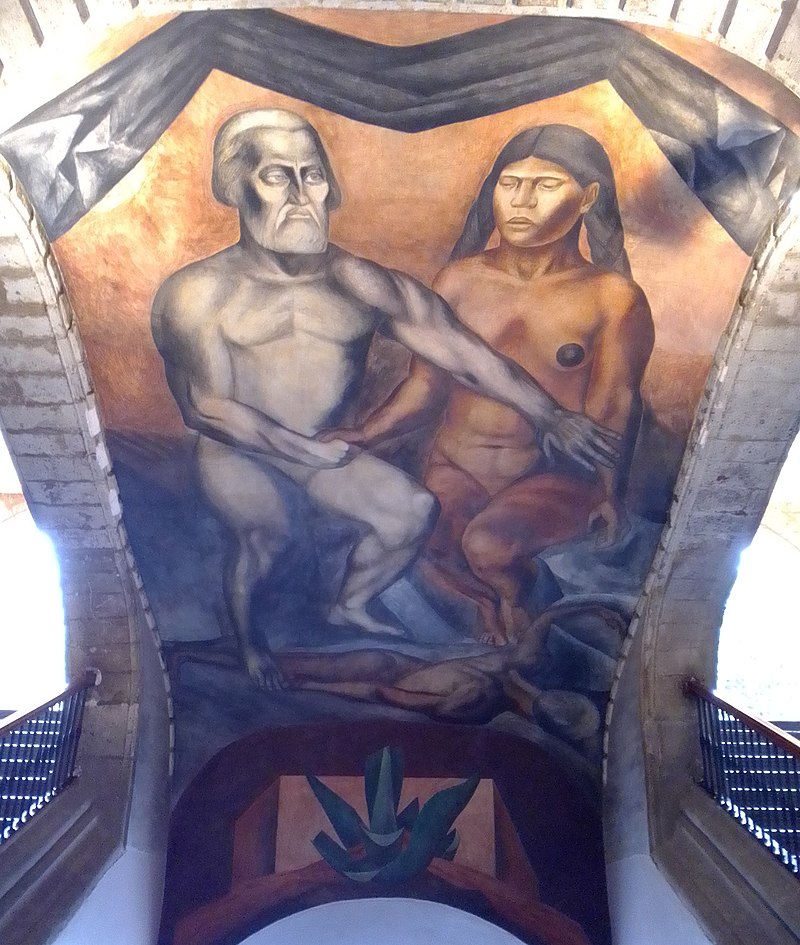
Cortés and La Malinche is a mural by José Clemente Orozco frescoed in 1926. It is preserved on the main staircase of the Antiguo Colegio de San Ildefonso, located in the centre of Mexico City.
Cortés not only conquered Mexico-Tenochtitlan in 1519-1521, the seat of the Aztec empire, but also initiated the interbreeding of Iberian White and American Indian. One need only travel to contemporary Mexico to see the ravages of this miscegenation sanctioned by both the Catholic Church and the Spanish Crown.
Now, as I have also said recently, the pre-Christian Visigoths of ancient Hispania burned at the stake any couple who dared to procreate a mongrel baby. What a reversal of values between this taboo of the pagan Goths and the 16th-century mixing perpetrated throughout the American continent! (remember that a large part of what is now the US belonged to New Spain).
This miscegenation on a scale never seen before was, in my opinion, worse than Washington’s philo-Semitism because it condemned the newly discovered continent to perennial underdevelopment, at least in the part that was colonised by the Spaniards and the Portuguese.
By expressing myself in this way about the country of my birth, I have become such an outcast that I have not a single friend, so I never carry with me my cellphone (which I only use for my bank account). But what I want to get at is that, if I express myself in this way about Cortés and the Iberian conquistadors who mixed their blood, why shouldn’t I also express myself harshly about the Founding Father of the neighbouring country to the north and his philo-Semitic epigones?
by Ragnar Redbeard [1]
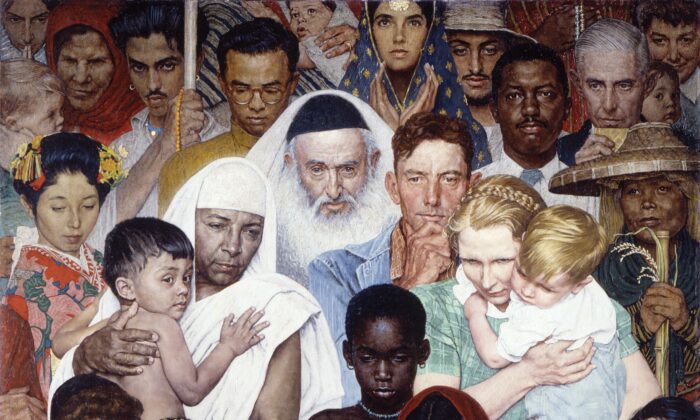
The Golden Rule by Norman Rockwell (oil on canvas). Fifteen years after WW2, The Saturday Evening Post relaxed its stance on the depictions of races other than white people. One of the first multiracial images to grace the cover of the Post was Rockwell’s The Golden Rule.
Is the Golden Rule a rational rule? — Is it not rather a menial rule — a coward rule — a best-policy rule? Why is it ‘right’ for one man to do unto others as he would have others do to him and, what is right? If ‘others’ are unable to injure him or ‘do good’ to him, why should he consider them at all? Why should he take any more notice of them than of so many worms? If they are endeavouring to injure him, and able to do it, why should he refrain from returning the compliment? Should he not combat them, does not that give them carte-blanche to injure and destroy him? May it not be ‘doing good’ to others, to war against them, to annihilate them? May it not also be ‘good’ for them to war against others? (Again, what is ‘good’?)
Is it reasonable to ask preying animals, to do unto others as they would be done by? — If they acted accordingly would they, could they survive? If some only accepted the Golden Rule as their guiding moral maxim, would they not become a prey to those who refused to abide thereby?
Upon what reasonable and abiding sanction does this ‘Rule’ rest? — Has it ever been in actual operation among men? — Can it ever be successfully practiced on earth — or anywhere else? — Did Jesus Christ practice it himself upon all occasions? — Did His apostles, his ‘sons of thunder’ practice it? — Did Peter the boaster do so, when he ‘denied Him’ for fear of arrest at the camp-fire? — Did Judas the financier, when he sold him for net cash? Also, how many of his modern lip-servants actually practice it in their daily business intercourse with each other? How Many?
These questions require no formal answering. They answer themselves in the asking. And here it must be remembered that the best test of a witness, is cross-examination. ‘Do unto others as you would have others do to you.’ No baser precept ever fell from the lips of a feeble Jew.
It is from alleged moralisms of this sort, and fabulous ‘principles’ that our mob orators, our communards, revivalists, anarchists, red-republicans, democrats, and other mob-worshippers in general derive the infernal inspiration that they are perpetually hissing forth. Even the subversive pyrotechnic watchwords of their mephisto-millennium, are to be found in the ‘holy gospels.’ Is it not written, ‘and God sendeth angels to destroy the people?’ — Behold! these men are the ‘angels’ that He sends: — politicians and reformers!
‘Love one another’ you say is the supreme law, but what power made it so? — Upon what rational authority does the Gospel of Love rest? — Is it even possible to practice, and what would result from its universal application to active affairs? Why should I not hate mine enemies, and hunt them down like the wild beasts that they are? Again I ask, why? If I ‘love’ them does that not place me at their mercy? Is it natural for enemies to ‘do good’ unto each other and, what is ‘good’? Can the torn and bloody victim ‘love’ the blood-splashed jaws that rend it limb from limb? Are we not all predatory animals by instinct? If humans ceased wholly from preying upon each other, could they continue to exist?
‘Love your enemies and do good to them that hate you and despitefully use you,’ is the despicable philosophy of the spaniel that rolls upon its back, when kicked. Obey it, O! reader, and you and all your posterity to the tenth generation shall be irretrievably and literally damned. They shall be hewers of wood, and carriers of water, degenerates, Gibeonites. But hate your enemies with a whole heart, and if a man smite you on one cheek, smash him down; smite him hip and thigh, for self-preservation is the highest law.
He who turns the ‘other cheek’ is a cowardly dog — a Christian dog.
Give blow for blow, scorn for scorn, doom for doom, with compound interest liberally added thereunto. Eye for eye, tooth for tooth, aye four-fold, a hundredfold. Make yourself a Terror to your adversary and when he goeth his way, he will possess much additional wisdom to ruminate over. Thus shall you make yourself respected in all the walks of life, and your spirit — your immortal spirit — shall live, not in an intangible paradise, but in the brains and thews of your aggressive and unconquerable sons. After all, the true proof of manhood is a splendid progeny; and it is a scientific axiom that the timid animal transmits timidity to its descendents.
If men lived ‘like brothers’ and had no powerful enemies (neighbors) to contend with and surpass, they would rapidly lose all their best qualities; like certain oceanic birds that lose the use of their wings, because they do not have to fly from pursuing beasts of prey. If all men had treated each other with brotherly love since the beginning, what would have been the result now? If there had been no wars, no rivalry, no competition, no kingship, no slavery, no survival of the Toughest, no racial extermination, truly what a festering ‘hell fenced in’ this old globe would be?
_____________
[1] According to Wikipedia it was Arthur Desmond (1859-1929) who wrote under the pen name ‘Ragnar Redbeard’.
